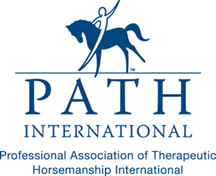|
Rick, a wary teenager, carried the heavy burden of a painful past. Raised in an abusive household, he learned early on that showing emotions could lead to more hurt. He became very good at hiding his feelings, always saying he was "fine," even when he was really hurting inside. By the time Rick started equine assisted counseling, his emotional walls were firmly in place. At the ranch, Rick met Maggie, a gentle and perceptive therapy horse with a unique ability to sense the emotions of those around her. Despite Rick’s calm appearance, Maggie quickly sensed the storm brewing inside him. Whenever Rick said he was "fine," Maggie would respond with gentle nudges or restlessness, sensing the truth behind his words. In their sessions together, Maggie could see into Rick's inner world. She would nuzzle him gently when he was sad, stand quietly by his side when he was anxious, and sometimes even refuse to move when Rick was especially guarded. These subtle but powerful reactions from Maggie showed the difference between Rick's words and his emotions. Rick's counselor helped him understand these interactions, showing him that Maggie was responding to his true feelings, not the mask he wore. At first, this made Rick uncomfortable. He wasn’t used to anyone, let alone a horse, seeing through his defenses. But Maggie's kind presence and patience slowly chipped away at his emotional armor. One memorable moment stands out in Rick's journey. During a tough session, Rick stood beside Maggie, insisting he was fine. Maggie stepped closer and rested her head gently on his shoulder. This simple act of comfort broke through Rick's walls. He began to cry, letting out all the feelings he had been holding inside. Maggie stayed with him, her calm and steady presence giving him the safety he had never known. This breakthrough marked the beginning of a big change. Rick started to trust the process, realizing that he was in a safe space where he could express his true self. With Maggie's help, he began to explore his emotions, understanding that they were valid and deserved to be felt and expressed. As Rick grew more comfortable with his feelings, he started to share more about his past, his fears, and his dreams for the future. He learned to recognize and name his emotions, a skill that had eluded him for so long. Maggie was there every step of the way, her quiet support reinforcing the lessons Rick was learning. Over time, Rick’s relationship with Maggie helped him rebuild his sense of self. He no longer felt the need to hide behind a facade of being "fine." He embraced his emotions, understanding that they were a vital part of his healing process. Rick found strength in his vulnerability, realizing that it was okay to show his true feelings. Today, Rick is a testament to the power of healing and self-discovery. With Maggie and the equine assisted counseling program, he found a path to emotional resilience and self-awareness. Rick learned that he is safe, valued, and worthy of love and understanding. His journey with Maggie transformed his life, teaching him that it is not only okay but necessary to be true to himself. If you or someone you know could benefit from similar services, contact us to learn more about our programs. For those looking to make a difference, consider donating to support services that empower youth like Rick on their path to healing and growth.
0 Comments
Welcome to another edition of the STEPS Herd Member Spotlight! Today, we're delighted to feature an interview with Maggie, the matriarch of the STEPS herd. Conducting the interview is none other than our very own Bob, a charming and curious member of the herd who always brings a unique perspective to our conversations. Let's dive right in and hear Maggie's incredible story in her own words. Bob: Hi Maggie! Thanks for taking the time to chat with me today. Let's start at the beginning. Can you tell us a bit about your life before coming to STEPS? Maggie: Hi Bob! It's a pleasure to chat with you. My story began in a place I’d rather forget—a kill lot. It was December 2014 when a rescue group found me and my filly, Molly. We were both in a pretty rough spot, and I was terrified of what the future held. Bob: That sounds really scary. How did you end up getting rescued? Maggie: The rescue group managed to track down my previous owner through my papers. Molly was my first foal, and I was very protective of her. They noticed an indentation on my side where a girth would go, a sign that I had experienced some rough handling in the past. The Thomas Foundation was contacted to take Molly. When they arrived, they insisted on taking in just Molly, but also me and another orphaned filly named Candy. Bob: Wow, that must have been quite a day. I heard you gave them a bit of a chase? Maggie: [laughs] Yes, I did! Molly and Candy loaded easily, but I wasn’t so sure. I broke loose and led everyone on a merry chase around the pasture. I guess I was just too scared to face what might come next. Eventually, I realized they meant no harm and agreed to load. Bob: It's completely understandable to be cautious. So, where did you go after that? Maggie: I moved around a bit and got to know some wonderful humans who took great care of me. Eventually, Molly and Candy were adopted together by a wonderful family in Sedona in December 2020. They’re now working cow horses on thousands of acres, living their best lives. Bob: It must have been hard to be separated from Molly and Candy. Did you make any new friends at the ranch? Maggie: Absolutely, it was tough to see them go, but I’m so happy they found a good home. At the ranch, I became great friends with Sissy. We’ve been inseparable ever since. I only agreed to come to STEPS if Sissy could come with me. Bob: It's great to hear you found a close friend in Sissy. How would you describe your life now at STEPS? Maggie: Life at STEPS is peaceful and fulfilling. I get to be with my herd, enjoy the company of wonderful people, and most importantly, feel safe and loved. I’ve always been a protector, and here, I can finally let my guard down and let others take care of me too. Bob: Speaking of letting your guard down, I wanted to ask you about your work with clients who have experienced trauma and PTSD. With PTSD Awareness Month upon us, could you tell us how you help these clients through equine assisted counseling? Maggie: Absolutely, Bob. Equine assisted counseling can be incredibly beneficial for clients with PTSD. The grounding effect of interacting with us horses helps clients feel safe enough to start processing their past trauma. Horses, like us, live in the present moment. When clients spend time with us, they often find it easier to stay grounded and focus on the here and now. Bob: That makes a lot of sense. How do you think being among the herd helps clients let their guard down? Maggie: When clients are among us, they often feel accepted and understood without judgment. Our calm and gentle nature provides a sense of security, allowing them to relax and let their defenses down. It’s much like how I feel safe and loved here at STEPS. This environment helps clients begin to trust again, both in themselves and in others. Bob: That sounds really powerful. Can you talk about how clients learn to readjust to life after trauma by observing the herd? Maggie: Certainly. Horses are naturally aware of our surroundings but not overly hypervigilant. We respond to potential threats appropriately, but once we assess that we’re safe, we return to a calm state. Clients can learn a lot from observing this behavior. It shows them how to balance awareness with relaxation, helping them understand that it’s possible to feel safe without being constantly on high alert. Bob: That’s such an important lesson. What about the acceptance and empathy people feel from the herd? How does that contribute to their healing? Maggie: The acceptance and empathy they feel from us are crucial for their healing. Many clients with PTSD have experienced rejection or misunderstanding from others. Here, they find unconditional acceptance. We don’t judge their past or their pain. Instead, we offer a nonverbal connection that can be incredibly soothing and validating. This empathy helps clients feel seen and valued, which is a significant step toward healing. Bob: I know the work you do is truly transformative. How do you feel being a part of this process? Maggie: It’s incredibly fulfilling, Bob. Knowing that I can help someone find peace and start healing from their trauma is a wonderful feeling. Just as I found a safe haven here, I’m glad to be part of providing that for others. It’s a beautiful cycle of healing and connection. Bob: Thanks for sharing, Maggie. It’s clear that your work is making a big difference in the lives of many. Here’s to continuing to support and heal together, especially during PTSD Awareness Month. Maggie: Thank you, Bob. It’s been a pleasure talking with you. Here’s to our wonderful herd and the bright future ahead! Stay tuned for more heartwarming stories and interviews from our beloved herd members. Until next time, take care and cherish the bonds that make us family. During PTSD Awareness Month, you can make a difference by Donating or joining Maggie's Carrot Club! Want to work with Maggie as a client? Fill out a Counseling Interest Form! Finding Strength and Healing from Trauma: Rosa's Journey with Belle in Equine Assisted Counseling5/29/2024 Rosa* walked slowly toward her new therapist, her heart heavy with the memories that had haunted her for years. The path to this place had been long and arduous, marked by a series of painful experiences from childhood that had cast long shadows into her adulthood. Today, she was meeting the STEPS Herd. Upon entering the pasture, Rosa was immediately drawn to Belle. As Rosa approached, Belle lifted her head from the hay, her large brown eyes locking onto Rosa's. There was something profoundly soothing in Belle's gaze, a calmness that seemed to radiate from the very core of the horse. Rosa felt a slight easing of the tightness in her chest, a breath she didn't realize she'd been holding slowly escaping. The equine assisted counseling sessions were a new approach for Rosa, recommended by her former therapist after traditional methods had only scratched the surface of her deep-seated trauma. Belle, a beautiful black and white paint mare, was known for her remarkable ability to connect with people in profound ways, offering a sense of peace and validation through her presence. Belle approached Rosa without hesitation, her movements slow and deliberate. Rosa felt a mix of awe and anxiety as the horse came closer, eventually nuzzling her hand. The simple touch was grounding, pulling Rosa from the swirling vortex of her thoughts into the present moment. Her therapist observed quietly, letting the interaction unfold naturally. In the weeks that followed, Rosa's sessions with Belle became a sanctuary. As she stroked Belle's coat, Rosa would talk, sometimes in halting sentences, other times in a torrent of words, about her past. Belle's calming presence made it easier to face the painful memories, her warmth acting as a balm for Rosa's pain. One particularly difficult session, Rosa found herself overwhelmed by a flood of memories from her childhood. She stopped stroking Belle and sank to the ground, tears streaming down her face. Belle, sensing Rosa's distress, lowered her head and nuzzled Rosa gently. The horse's soft breath against her skin was a reminder of the present, a contrast to the harshness of the past she was reliving. "Feel Belle's presence," the therapist’s voice came softly. "She's here with you, right now." Rosa reached up, running her fingers through Belle's mane. The simple act of connecting with the horse brought her back to the here and now, away from the dark corners of her mind. Belle's steady, rhythmic breathing was like an anchor, grounding Rosa in a moment of safety. As Rosa continued her sessions, she noticed changes within herself. Belle's feedback, though silent, was profound. When Rosa was anxious or angry, Belle would become still, a contrast to Rosa’s inner turmoil. These interactions helped Rosa recognize her own emotions more clearly. She began to understand the impact of her feelings, not just on herself, but on those around her. Belle's reactions were honest and immediate, devoid of judgment, and this unfiltered feedback was invaluable. It allowed Rosa to see her emotions not as something to be feared or suppressed, but as natural responses to her experiences. One day, during a session, Rosa felt a surge of anger as she recounted an incident from her past. Rosa then quickly tried to push the anger back down. Belle took a few steps back, her ears flicking with unease. Rosa paused, realizing the impact of her avoidance of her emotions. She took a deep breath, consciously acknowledging the emotion. Belle's ears relaxed, and she stepped forward again, closing the gap between them. "You're learning to manage your emotions," the therapist observed. "Belle is showing you how it’s okay to feel what you’re feeling." Rosa nodded, a small smile forming on her lips. For the first time in a long while, she felt a sense of control over her own emotions, a sense of empowerment. The validation Rosa found through Belle's treatment was transformative. Belle accepted her without hesitation, offering companionship without demands. This unconditional acceptance helped Rosa see her own worth and strengths. She began to believe in her ability to heal, to find peace amidst the chaos of her past. Months later, Rosa stood beside Belle, her hand resting on the horse's neck. The journey was far from over, but Rosa felt a resilience she hadn't known before. Belle had not just been a companion; she had been a guide, leading Rosa through the labyrinth of her traumas to a place of acceptance and strength. As Rosa pressed her forehead gently against Belle's, she whispered, "Thank you." The mare nickered softly, as if acknowledging the words. In that moment, surrounded by the quiet of the stable and the steady presence of Belle, Rosa felt a profound sense of gratitude and hope for the future. *Name and details changed to protect client privacy and identity. Photo does not depict real client. Belle is proudly sponsored by Navy Federal Credit Union. To join Belle's Carrot Club and support her powerful work, visit Belle's page. Want to work with Belle as a client? Fill out the Counseling Interest Form! Bob: Hey there, everyone! It's Bob, your favorite mini therapy horse, and today I've got a special guest joining me for an interview. Please welcome my dear herd mate, Belle! Belle: Hi, Bob! Thanks for having me. Bob: Of course, Belle! Now, let's dive into your background. I heard you've had quite the journey. Can you tell us a bit about where you came from and how you ended up here? Belle: Sure thing, Bob. My journey began when I was pulled from an Oklahoma kill lot back in December of 2014. It was a rough start, but things started looking up when I came to the Thomas Foundation Second Chance Horse Rescue with my friend Catalina. I moved around a bit before coming back to the Thomas Foundation. In late 2021, I was honored to join the STEPS herd and start my next life chapter. Bob: Wow, quite the adventure! Now, let's talk more about equine assisted counseling. You've developed a reputation for really being an expert at helping humans heal. Can you share your perspective on how it helps? Belle: Equine assisted counseling provides a safe space for clients to feel grounded and discuss stressful or upsetting experiences. Being in the presence of horses like us helps clients feel more at ease and open to exploring their emotions. Bob: That makes sense, Belle. How do you see the feedback from equines helping people to recognize their emotions and gain insight into their thoughts, feelings, and behaviors? Belle: We are incredibly sensitive animals, Bob. We can pick up on subtle cues from humans and reflect their emotions back to them. For example, if a client approaches me feeling anxious, I respond authentically to that anxiety, helping the client recognize and process their own feelings. This feedback loop fosters self-awareness and emotional insight. Bob: Interesting, Belle. Equine assisted counseling also offers opportunities for clients to practice life skills. Can you give us some examples of these skills? Belle: Absolutely, Bob. Clients have the chance to practice calming techniques, such as deep breathing and visualization, while interacting with us. They also learn important communication skills by working with us nonverbally and setting boundaries in our interactions. These skills are invaluable for managing stress and building healthy relationships. Bob: Lastly, Belle, how do you think equine assisted counseling helps clients explore patterns and parallels between their experiences with equines and their day-to-day lives? Belle: Equine assisted counseling allows clients to draw parallels between their interactions with us and their everyday experiences. For instance, if a client struggles with trust issues, they may notice similarities between their relationship with me and their relationships with others. By exploring these patterns, clients can gain insight into their behaviors and make positive changes in their lives. Bob: Thank you for sharing your insights with us, Belle. If you're inspired by our work and want to support us in helping more people, consider donating through the Seen Through Horses campaign. Your contributions go directly towards supporting Belle, myself, and our herd mates in providing healing and support to those in need. Together, we can make a difference! https://seenthroughhorses.raisely.com/t/steps-with-horses Want to work with Belle as a client? Fill out our Counseling Interest Form! Want to hear from Belle directly and become one of her biggest fans? Join Belle's Carrot Club! Bob: Good morning, Keyman! I'm excited to sit down with you today and delve into your journey and the science behind the human-horse bond. Keyman: Good morning, Bob! I'm glad to be here and share my experiences with you. Bob: Let's start with your background. I understand your real name is Karas Kiyara, meaning "the best," and you come from a remarkable lineage, with the legendary Black Stallion as your great-great-grandfather. Can you tell us a bit about your family history and how it has influenced you? Keyman: Absolutely. My lineage is something I take great pride in, as it symbolizes strength, resilience, and a deep connection to the equine world. The legacy of the Black Stallion has always inspired me to strive for greatness and forge meaningful bonds with those around me. Bob: That's truly inspiring, Keyman. Now, let's talk about your journey to STEPS. I understand you underwent some significant life changes before finding your way here. Could you share a bit about that and how you and Starbuck became such close companions? Keyman: Of course. Life has a way of throwing unexpected challenges our way, and I've certainly had my share of them. After navigating through a period of change, I found solace and purpose here at STEPS. Starbuck and I connected on a profound level from the moment we met. His unwavering support and companionship have been invaluable to me as I've navigated this new chapter of my life.  Bob: It's incredible how we as horses can provide such comfort and support during times of transition. Now, let's delve into the science behind the human-horse bond and how we use it in equine assisted counseling. We often hear about the powerful bond between humans and animals, but could you explain how this bond translates into therapeutic benefits? Keyman: Absolutely. The human-animal bond is a truly remarkable phenomenon with profound therapeutic implications. When individuals interact with animals, such as horses, their bodies can release oxytocin, often referred to as the "social connection hormone." This hormone promotes feelings of trust, relaxation, and well-being, making clients more receptive to the counseling process. Additionally, the presence of animals has been shown to reduce cortisol levels, the stress hormone, which can help alleviate anxiety and promote emotional regulation. Interacting with animals also lowers human blood pressure, improves their heart rate, and reduces their anxiety. Bob: That's fascinating. It's incredible to think about the physiological and emotional benefits that come from simply being in the presence of animals. Can you elaborate on how horses, in particular, are adept at reading and responding to human emotions? Keyman: Absolutely. We as horses are incredibly intuitive animals with a keen ability to sense and respond to human emotions. We are masters at reading their subtle cues such as body language, facial expressions, tone of voice, and even scent. This heightened sensitivity allows us to read and respond to the emotional state of our human clients, creating opportunities for profound insight and growth. By providing nonverbal feedback and validation, we enhance the therapeutic process and deepen the connection between our clients and counselors.  Bob: It's truly remarkable how we can facilitate healing in such a unique way. Well, Keyman, thank you so much for sharing your story and insights with us today. It's been a pleasure getting to learn more about the transformative power of our relationship with humans. Keyman: Thank you, Bob. It's been a pleasure sharing my experiences with you. I hope our conversation has shed light on the profound impact that we can have on our human friends’ lives and well-being Want to hear more from Keyman? Join Keyman's Carrot Club and support his care! Interested in working with Keyman as a client? Fill out a Counseling Interest Form! Bob: Hello, everyone! I'm Bob, the Human-Equine Relations Manager here at STEPS With Horses, and today I have the pleasure of interviewing none other than our esteemed herd member, Snoop! Snoop, it's an honor to have you here. Snoop: Thanks, Bob! It's great to be here and share a bit of my story with everyone. Bob: So, Snoop, I've heard that you had quite the illustrious career before joining us here at STEPS. Could you tell us a bit about your background? Snoop: Of course! Well, before I came to STEPS, I spent many years competing in the show ring. I'm a Palomino Quarter Horse born in Georgia, and my original owners affectionately called me "Snoop" because I was always on the lookout for treats, you know, snooping around! I had a successful career, even winning a World Championship in Western Pleasure. But as I got older, I started to feel like there was more to life than just ribbons and trophies. 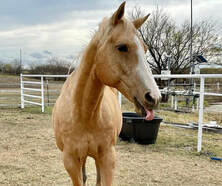 Bob: That's fascinating, Snoop. What made you decide to transition from the show ring to becoming a therapy horse? Snoop: It was a combination of factors, really. As I aged, I began to appreciate the importance of connection and empathy. I realized that my calm demeanor and gentle nature could bring comfort and healing to others. When I learned about the work that STEPS does, I knew it was the perfect fit for me. And I just really love people - sometimes event more than other horses! Bob: Can you tell us more about the STEPS Model and how it aligns with your own values? Snoop: Absolutely. The STEPS Model, which stands for Spectrum of Therapeutic Equine-Partnered Services, is a comprehensive approach to equine assisted mental health services. It's all about meeting each client where they are and providing ongoing support throughout their journey. At the core of the STEPS Model is equine assisted counseling (EAC). This phase involves licensed therapists (or therapists-in-training) and equine professionals working together to help clients address a wide range of mental health concerns. Whether it's anxiety, depression, trauma, or relationship issues, EAC provides a safe space for clients to explore and heal. And here's where I come in—I'm actively involved in EAC sessions, providing comfort, support, and a non-judgmental presence for clients as they navigate their therapeutic journey. Bob: That sounds incredibly impactful, Snoop. What happens after clients complete the counseling phase? Snoop: Once clients have met their counseling goals or made substantial progress, they have the opportunity to join the therapeutic horsemanship program. This nonclinical program focuses on learning horsemanship and riding skills in a supportive environment. Our specially trained therapeutic riding instructors ensure that every client feels safe and empowered, regardless of their mental health challenges. In the therapeutic horsemanship program, I play a different role. I become a partner in learning, helping clients develop confidence, communication skills, and a deeper understanding of horsemanship. Whether it's grooming, leading, or riding, I'm there every step of the way, offering gentle guidance and unwavering support. 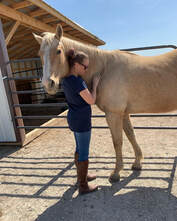 Bob: It's wonderful to hear how STEPS prioritizes the well-being of its clients every step of the way. How has your experience been since joining the STEPS herd? Snoop: It's been truly fulfilling, Bob. I love being able to connect with people on a deeper level and witness their progress firsthand. Whether it's a quiet moment of reflection in the pasture during EAC sessions or a joyful ride around the arena in the therapeutic horsemanship program, every interaction reminds me of the power of human-animal bonds. And knowing that I'm making a difference in someone's life brings me immense joy. Bob: That's fantastic, Snoop. Before we wrap up, is there anything else you'd like to share with our audience? Snoop: Absolutely, Bob. One aspect of the STEPS Model that I find particularly innovative and impactful is its provision of post-counseling support through the therapeutic horsemanship program. It's rare to find mental health services that offer such comprehensive and ongoing support beyond the counseling phase. This unique approach ensures that clients continue to receive the care and guidance they need to maintain their progress and thrive in the long term. Bob: Well said, Snoop. Thank you for highlighting that important aspect of the STEPS Model. Snoop: My pleasure, Bob. And thank you to everyone at STEPS for welcoming me with open arms. Together, we're making a real difference in the lives of our clients, one hoofbeat at a time. Bob: And there you have it, folks! Snoop, the champion-turned-therapy-horse, proving that sometimes the greatest victories are found not in the show ring, but in the hearts of those we touch. Until next time, keep spreading love and kindness, just like Snoop here at STEPS With Horses. About STEPS With Horses STEPS With Horses is a leading provider of equine assisted mental health services, dedicated to promoting healing and growth for individuals facing mental health challenges. Through a holistic approach and the power of human-animal bonds, STEPS empowers clients to overcome obstacles and thrive. To support Snoop and the STEPS With Horses herd, join Snoop’s Carrot Club! Want to work with Snoop as a client, fill out our Counseling Interest Form! Want to make a general donation, support STEPS’ participation in the national Seen Through Horses campaign Bob: Welcome, Mama Mia! It's such a pleasure to have you here for this interview. Let's dive right in. Can you tell us a bit about your experience with Equine-Partnered Play Therapy and why you enjoy working with young children? Mama Mia: Thank you, Bob! I'm thrilled to be here. Well, my journey with Equine-Partnered Play Therapy began about seven years ago, and it's been an incredibly fulfilling experience ever since. There's just something magical about connecting with children and helping them through the challenges they face using the unique bond we share with them as play therapy horses. Bob: Absolutely, there's something truly special about the bond between horses and children. Could you elaborate on how Equine-Partnered Play Therapy works? Mama Mia: Of course! Equine-Partnered Play Therapy is a form of therapy where horses like us are integrated into the therapeutic process to help children develop emotional regulation, improve social skills, and work through various emotional or behavioral issues. During sessions, children engage in various activities with us, such as playing with toys, grooming, leading, or even just spending quiet time together in our presence. These activities provide opportunities for children to build trust, learn empathy, and develop confidence. 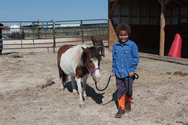 Bob: That sounds incredibly impactful. Can you share some of your most memorable experiences working with children in equine partnered play therapy? Mama Mia: Oh, there have been so many memorable moments! One that stands out to me is when I worked with a young boy who was struggling with severe anxiety. Through our sessions together, he gradually learned to calm himself by watching how I overcame my fears when something startled me. Watching him gain confidence and learn to manage his anxiety was incredibly rewarding. Bob: That's truly inspiring, Mama Mia. I'm sure our audience would love to know more about the collaborative approach involved in EPPT. 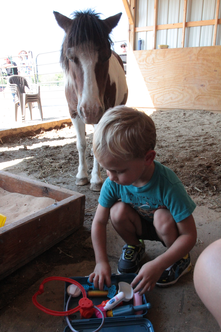 Mama Mia: Of course, Bob. EPPT involves a team effort between licensed mental health professionals trained in play therapy and equine professionals who understand horse behavior and child development. Together with our human co-facilitators, we create a supportive environment where children feel valued and understood. Bob: Thank you for sharing that, Mama Mia. Before we wrap up, could you tell us how EPPT impacts children's motivation and enthusiasm for therapy? Mama Mia: Certainly, Bob. The mere presence of horses often ignites excitement and motivation in children to participate in therapy sessions. Knowing they'll spend time with us fosters anticipation and enthusiasm, making the therapeutic process more engaging and effective. Bob: That's wonderful to hear, Mama Mia. It's wonderful to have you as my equine play therapy co-facilitator. Your dedication to this work is truly inspiring. Before we wrap up, is there anything else you'd like to share about your love for working with young children in Equine-Partnered Play Therapy? Mama Mia: Just that every day I am grateful for the opportunity to make a positive impact in the lives of these children. The bond we share with them is truly special, and I believe in the transformative power of equine therapy. It's an honor to be a part of their journey towards healing and growth. Want to work with Mama Mia in Equine-Partnered Play Therapy? Fill out a Client Interest Form! Interested in hearing more from Mama Mia and receiving special tokens of her affection? Join Mama Mia's Carrot Club! Bob: Hello everyone, and welcome to today's special interview with Max, a remarkable therapy horse in our herd. Max, it's great to have you here. Max: Thank you, Bob! I'm excited to share my story with everyone. Bob: So, Max, let's start from the beginning. Can you tell us about your past as a competitive reining horse? Max: Absolutely, Bob. I had a successful career as a reining show horse, competing in Western competitions showcasing my agility, responsiveness, and precision. Reining is a western riding competition where horses perform a set pattern that includes spins, circles, stops, and sliding stops. I loved the thrill of it all. Here’s a fun fact about me - I am a registered American Quarter Horse and my real name is Legendary Slider! Max is my nickname. Bob: That sounds incredible. Unfortunately, your career was cut short due to an injury, right? Max: Yes, it was a tough time for me. I sustained an injury that prevented me from continuing in the show ring. However, that turned out to be a turning point in my life. 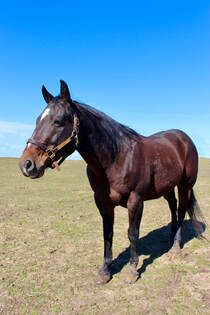 Bob: Can you share how you transitioned from a show horse to becoming a therapy horse in the STEPS program? Max: After my injury, my owners, realizing I had so much more to offer, decided to donate me to join STEPS with Horses so I could participate in STEPS’ counseling and therapeutic riding program to help individuals facing various challenges through the healing power of horses. Bob: That's wonderful. How did you initially adjust to being a therapy horse and joining the herd? Max: It was challenging at first. I was used to the spotlight of the show ring and had to learn how to get along with the other herd members. I wasn’t used to living in such close contact with other horses which made integrating into the herd tough. I struggled to understand my new role and the dynamics of being in a herd. To be honest, I wasn’t so nice to some of my other herd members. Bob: How did you overcome those challenges? Max: With time and support from my fellow herd members. I learned the importance of empathy, patience, and being attuned to the needs of those around me. Gradually, I grew into my role as a leader and now look out for everyone in the herd, both human and equine. 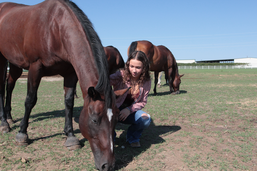 Bob: Recently, you participated in the Chisholm Challenge Horse Show as part of the Fort Worth Stock Show and Rodeo. Can you tell us more about this event and share your experience? Max: The Chisholm Challenge Horse Show is a unique event that takes place as part of the Fort Worth Stock Show and Rodeo. It's specifically designed for riders with unique challenges or disabilities. Participants get the opportunity to showcase their equestrian skills and demonstrate meaningful connections with therapy horses like me. It's an inclusive and empowering event that highlights the abilities of riders overcoming challenges. Oh, it was an amazing experience! I felt immense pride when I carried the flag during the opening ceremonies. Being part of such a prestigious event was an honor. But the real highlight was seeing my riders succeed in their events and winning ribbons. It filled my heart with joy to know I played a part in their achievements. Bob: That's truly heartwarming, Max. Your journey from a reining show horse to a therapy horse making a positive impact is inspiring. Thank you for sharing your story with us today. Max: Thank you, Bob, and thank you to everyone who supports the STEPS program. Together, we're making a difference one hoofbeat at a time. Want to support Max and hear from him more often? Join Max’s Carrot Club! Want to work with Max as a client? Fill out the Counseling Interest Form! Bob: Hello everyone, and welcome to another insightful session with our beloved therapy horses at STEPS with Horses. Today, I have the pleasure of cocking a hoof up with the wonderful Sissy, a true gem in our herd. Thank you for joining us, Sissy! Sissy: Hello, Bob! It's a pleasure to be here. Bob: Sissy, could you share a bit about your life before joining STEPS with Horses? We've heard you've had quite a journey. Sissy: Certainly, Bob. Several years ago, I was carrying a foal for a friend. Unfortunately, the foal didn't make it, and I faced some serious health challenges. I received the best care, but I was finished having babies. I later moved to the Thomas Foundation Second Chance Horse Rescue who helped me find my forever home with STEPS With Horses. My best friend, Maggie, and I moved to STEPS two years ago. We’ve made wonderful friends with the other herd members, especially my boyfriend, Max. Bob: It sounds like you've had quite the journey. Now, tell us about your friendship with Maggie and Max. What makes your bond so special? Sissy: Maggie and Max are like family to me. We're often inseparable, spending our days together. Max is the herd boss, and Maggie and I are always by his side. We share scratches, love, and of course, juicy grass. It's a special connection that brings joy to our days. Bob: That's remarkable, Sissy. The STEPS humans emphasize that our equine well-being is crucial, not just physically but emotionally. Can you tell us more about how the team cares for our herd emotionally? Sissy: The team here is amazing, Bob. They understand that our emotional well-being is just as important as our physical health. We have a comfortable and safe environment that allows us to express ourselves naturally. It's not just about being well-fed and healthy; it's about feeling content and emotionally secure. The attentiveness to our emotional needs contributes to the positive energy we bring into therapy sessions. 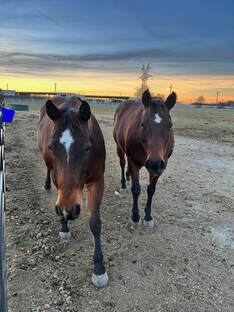 Bob: I completely agree, Sissy. Let’s go a little deeper and talk about some key elements of the humans’ counseling approach, Relational Equine-Partnered Counseling (REPC), and how it benefits our herd. One fundamental aspect is the belief in our capacity to be self-directed. In REPC, they view us not as entities to be controlled but as sentient participants in the therapeutic process. Sissy: That's right, Bob. Most of the time, we roam freely in our pastures, choosing what we want to participate in during sessions. If we feel like following a client around, we do. If we want to walk away, we do. This autonomy allows us to authentically express our reactions, creating genuine connections with our clients. Bob: I love talking about how REPC respects our autonomy, treating us as equal partners in the therapeutic relationship. Now, another distinctive element is the de-emphasis on structured activities. REPC values the development of insight and emotional regulation over completing specific exercises. How has this approach impacted your experience as a therapy horse? Sissy: Well, Bob, the organic and adaptable nature of REPC keeps our work engaging and mentally stimulating. Horses, like people, can get bored with repetitive tasks. REPC allows us to approach each session with freshness, making every day different. It's a stark contrast to more rigid equestrian activities that might become monotonous for us. Bob: That's a crucial insight, Sissy. REPC not only benefits our human clients but also contributes to our well-being as therapy horses by providing mental stimulation. Have you observed positive changes in some of your herd members since moving to STEPS? Sissy: Absolutely, Bob. I’ve really noticed positive changes in Echo and Belle, who came from the Thomas Foundation with Maggie and me. They were both pretty nervous with people, but have found their calling as therapy horses by building trust with both our human coworkers and our clients. It's a testament to the holistic impact of equine assisted counseling on all of my equine friends. 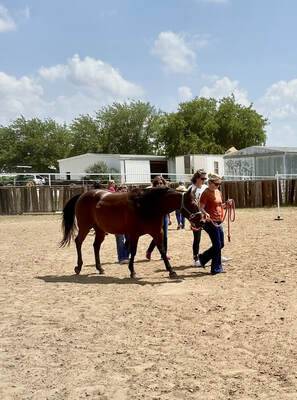 Bob: It truly sounds like a fulfilling role, Sissy. Lastly, how has being a therapy horse influenced your own well-being and happiness? Sissy: Being a therapy horse is fulfilling for me as well. It's not just about giving; it's also about receiving love and attention. The positive interactions with clients and the care from the STEPS team contribute to my overall happiness. It's a mutually enriching experience. Bob: It sounds like you've found your calling here, Sissy. We're grateful for the joy and love you bring to the STEPS herd family. Thank you for sharing your story with us. Sissy: Thank you, Bob. It's been a pleasure. And to everyone listening, come visit us at STEPS with Horses. We'd love to share some love and snuggles with you! Want to work with Sissy as a client? Fill out a Counseling Interest Form! Interested in hearing from Sissy every month and extra special gifts? Join Sissy's Carrot Club and support Sissy and her herd! Bob: Hello, everyone! I'm here today with a very special member of the STEPS with Horses herd, our esteemed miniature donkey, Donkey. Donkey, thank you for joining us today. Can you share a bit about your background and how you became the longest-standing member of the STEPS herd? Donkey: Well, hello, Bob! It's always a pleasure to chat. I've been with STEPS with Horses for quite a while now, the longest of the bunch, you could say. As you know, you and I came together from our last ranch, and I've seen this wonderful organization grow and flourish over the years. Bob: That's incredible, Donkey. Can you tell us about your role in equine assisted counseling and how long you've been working with clients? Donkey: Absolutely, Bob. I've been a part of the equine assisted counseling team for more than five years now. It's been a transformative experience for me. When I first started, I was quite scared of people – I'd run away from everyone. But through the counseling sessions, I found my purpose and calling in life. Helping clients, supporting them when they're feeling anxious or vulnerable, that's what I live for. 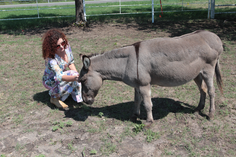 Bob: That's beautiful, Donkey. How has equine assisted counseling helped you build trust in people while also aiding your clients? Donkey: It's been quite the journey, Bob. Doing this counseling work helped me realize that people are here to support and care for me, just like I support and care for them. It's a mutual understanding that's built on trust and connection. As I've opened up to clients, I've seen them open up too. We've grown together, and it's a remarkable experience. Bob: That's truly heartwarming, Donkey. Now, I've seen that you're particularly good at picking up on when your clients are feeling anxious or vulnerable. Can you tell us more about how you show your support and protectiveness? Donkey: Absolutely, Bob. It's like I have a sixth sense for it. When clients are feeling uneasy or vulnerable, I step in front of them. It's a way of showing them that I'm here, I've got their back, and they're not alone. It's a silent communication that speaks volumes, and it's amazing to see the comfort it brings to our clients. Bob: Your empathy and support are truly commendable, Donkey. Now, I'd love for you to share with our audience about the Ride with Kendall campaign. Can you tell us more about it? Donkey: Absolutely, Bob. Kendall Hayley is an amazing human who's embarking on a motorcycle journey of a lifetime. He’s a long-distance endurance motorcyclist with over 300,000 miles logged on a Harley Davidson over the past 10 years who has been selected for the most extreme motorcycle challenge in the world, the Hoka Hey. In August 2024, Kendall will cover over 10,000 miles in 10-14 days, starting from the southern point of Key West, Florida, and finishing in Homer, Alaska. Bob: That sounds like an incredible challenge. Can you tell us more about the Hoka Hey and what makes it so unique? Donkey: Certainly, Bob. The Hoka Hey is not just a race; it's a challenge that pushes riders to their limits. It's more than a test of riding skill and endurance; it's a spiritual, mental, and physical challenge. Riders are equipped with only handwritten turn-by-turn directions, with no GPS or map navigation. They sleep outside next to their motorcycles each night. It's an event that truly challenges every aspect of a rider, from the selection process to reaching the finish line. 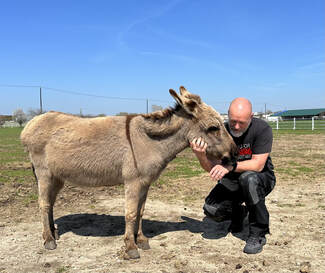 Bob: Kendall's dedication to such an extreme challenge is commendable. Why is Kendall riding for STEPS, and how does his journey connect with our mission? Donkey: Kendall's connection with STEPS' mission runs deep. As an Ordained Youth Minister, with a professional career in the death care industry, and a personal experience of losing a brother to suicide, Kendall understands the importance of mental health support. He sees the life-changing value in what STEPS with Horses does, especially for Veterans and At-Risk Teenagers. Riding for STEPS is Kendall's way of using his passion for motorcycling to raise awareness and support for an organization that directly impacts people he deeply cares for. It's a beautiful alignment of his personal experiences and his desire to make a positive difference. Bob: Thank you, Donkey, for shedding light on Kendall's incredible journey and the meaningful cause he’s riding for. It's heartening to see individuals like Kendall dedicating their efforts to support organizations like ours. Donkey: Thank you, Bob. And to everyone listening, remember, Kendall's ride is not just a motorcycle journey; it's a journey of empathy, compassion, and awareness. Let's all support his mission and make a difference together. You can even help Kendall reach his goal of raising a dollar per mile giving to https://donorbox.org/ride-with-kendall-hokahey Want to work with Donkey in counseling? Want to hear more from Donkey and support the herd?
|
AuthorSTEPS With Horses Archives
June 2024
Categories
All
|
Let's stay in touch!
Mailing AddressP.O. Box 123737
Fort Worth, TX 76121 |
Telephone |
|
A Texas Nonprofit Corporation and a 501(c)(3) Tax-Exempt Charitable Organization
Copyright 2024 S.T.E.P.S. With Horses










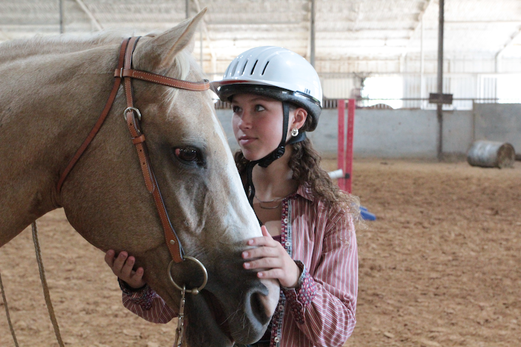
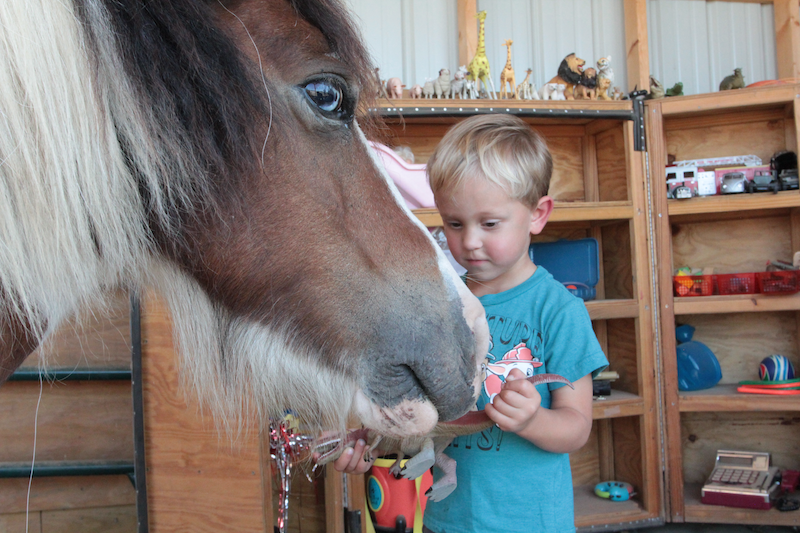
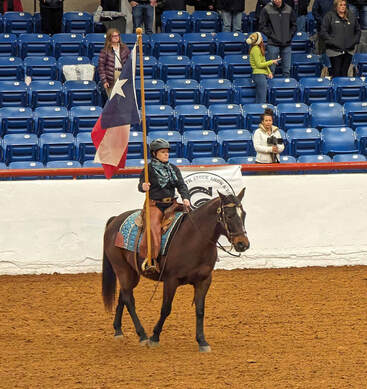
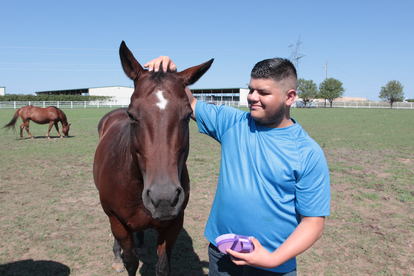
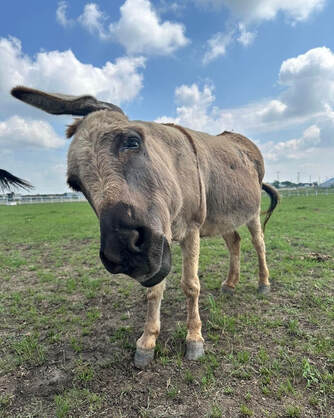
 RSS Feed
RSS Feed
